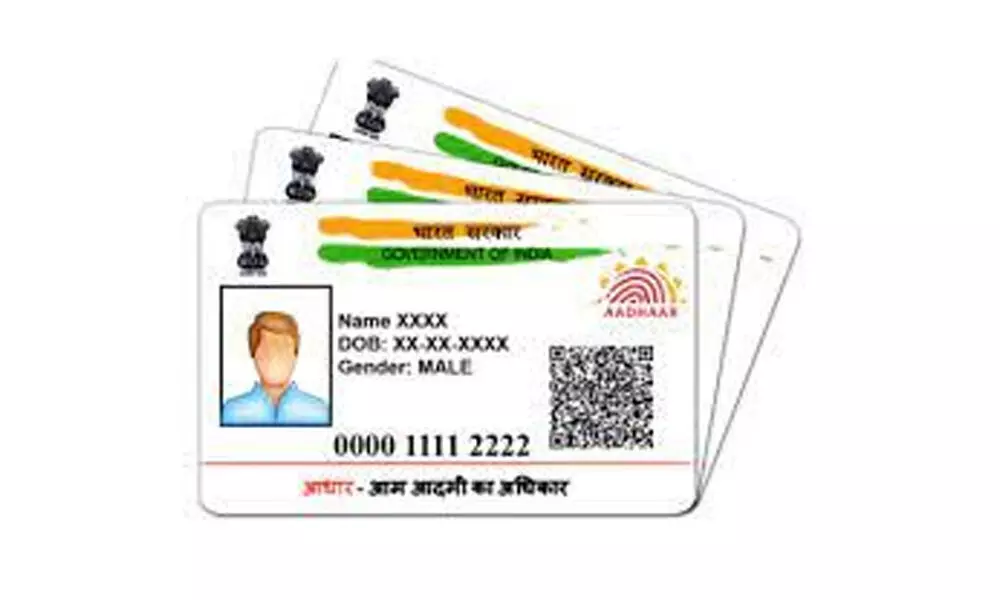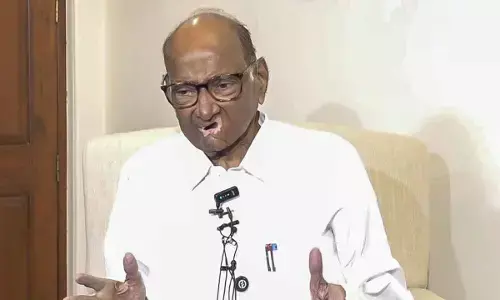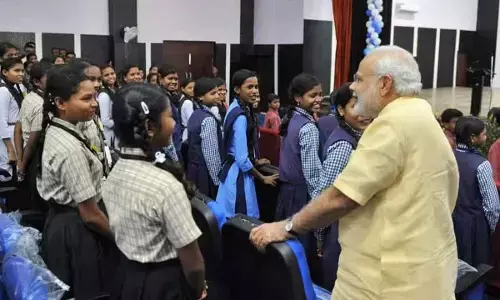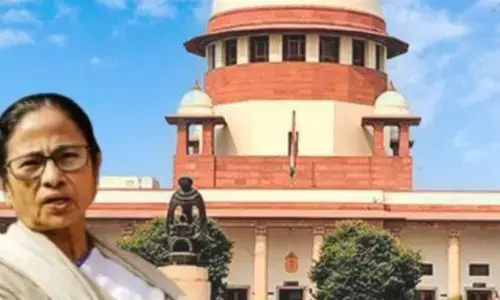10 cr Indians to remain niraadhaar?

10 cr Indians to remain niraadhaar?
Famous Supreme Court Judge V R Krishna Iyer on November 3, 2011 released the first critique book titled "AADHAAR; How a Nation is Deceived," authored by P B Jijeesh.
Famous Supreme Court Judge V R Krishna Iyer on November 3, 2011 released the first critique book titled "AADHAAR; How a Nation is Deceived," authored by P B Jijeesh. Justice Krishna Iyer said that "the project Aadhaar should not be implemented for it amounts to an assault on privacy and basic rights of individuals and is suited only for fascist nations." But the Supreme Court has certified the Aadhaar (Targeted Delivery of Financial and other Subsidies, benefits and services) Act, 2016 as constitutional and valid. Aadhaar number is being made inevitable for survival of a person in India.
It is originally meant for verifying the benefits being given by the government but later Aadhaar was made essential for the enforcement of their rights, which is now extended to right to vote also. If one does not get Aadhaar for some reason, one will be deprived of the right to vote. New Act says that linking is not mandatory but it also says it will be as 'prescribed by centre.'
When the burden of securing vote is shifted to the person, Aadhaar becomes essential by default. Originally, the preamble of Aadhaar Act, 2016 specifically limited Aadhaar to certain benefits only. It says: "An Act to provide for, as a good governance, efficient, transparent, and targeted delivery of subsidies, benefits and services…"
As per the Section 2(f) "benefit" means any advantage, gift, reward, relief, or payment, in cash or kind, provided to an individual or a group of individuals and includes such other benefits as may be notified by the Central Government.
Only for identity: Basically, it is for purposes of identity only. Section 4 [(3) says: Every Aadhaar number holder to establish his identity, may voluntarily use his Aadhaar number in physical or electronic form by way of authentication or offline verification, or in such other form as may be notified, in such manner as may be specified by regulations. This voluntariness is gradually disappearing.
The Government of India notified on December 16, 2010 that it would recognise a letter issued by the UIDAI containing details of name, address, and Aadhaar number, as an official, valid document. It was also clarified that Aadhaar is not intended to replace any existing identity cards, nor does it constitute proof of citizenship. Aadhaar neither confers citizenship nor guarantees rights, benefits, or entitlements.
Various committees studied and recommended to create a multi-purpose National Identity Card. It has become later, a unique ID which also qualifies as a valid ID while availing various government services such as LPG connection, a subsidised ration, kerosene from the PDS, or benefits under NSAP or pension schemes, e-sign, a digital locker, a Universal Account Number (UAN) under EPFO, and some other services such as a SIM card or opening a bank account.
According to the UIDAI website, any Aadhaar holder or service provider can verify the genuineness of an Aadhaar number through a user-friendly service of UIDAI called the Aadhaar Verification Service (AVS), which is available on its website. Also, a resident already enrolled under the National Population Register is not required to enrol again for Aadhaar.
Section 7 prescribed where the proof of Aadhaar becomes necessary. It says: Proof of Aadhaar number necessary for receipt of certain subsidies, benefits and services, etc.—The Central Government or, as the case may be, the State Government may, for the purpose of establishing identity of an individual as a condition for receipt of a subsidy, benefit or service for which the expenditure is incurred from, or the receipt therefrom forms part of, the Consolidated Fund of India, 1 [or the Consolidated Fund of State] require that such individual undergo authentication, or furnish proof of possession of Aadhaar number or in the case of an individual to whom no Aadhaar number has been assigned, such individual makes an application for enrolment:
The Proviso gave some relief because it said: Provided that if an Aadhaar number is not assigned to an individual, the individual shall be offered alternate and viable means of identification for delivery of the subsidy, benefit or service. This means, a person should not lose the benefits because he was not given 'Aadhaar number.' But practically, persons without Aadhaar will lose all the benefits, rights and even facilities.
What is this number?
What is Aadhaar number? Section 2(a) defines: "Aadhaar number" means an identification number issued to an individual under sub-section (3) of section 3, and includes any alternative virtual identity generated under sub-section (4) of that section;]
What for?
The number is meant for authentication, which is defined as 2(c) "authentication" means the process by which the Aadhaar number along with demographic information or biometric information of an individual is submitted to the Central Identities Data Repository for its verification and such Repository verifies the correctness, or the lack thereof, on the basis of information available with it; Section 9 proclaims it is neither proof of citizenship nor domicile.
Right of every resident
While declaring that it is right of every resident, the Act clarifies that it is not even proof of residence. Section 3 provided a statutory right to be entitled to secure an Aadhaar Number. It says: "1) Every resident shall be entitled to obtain an Aadhaar number by submitting his demographic information and biometric information by undergoing the process of enrolment:" While the law gave this entitlement, the proviso to Section 3 gives the Centre power to limit this right by prescribing conditions. Executive government, i.e., Centre or its bureaucrats may reduce this right to a non-entity. It will get absolute power to deny this right to anyone.
The law authorises the use of number voluntarily but the prefix says 'may'. The expression 'may' in legal language is vulnerable to be reduced to nothing. Section 4 authorises Regulatory to use it for verification.
Security of Information
Section 30 says the biometric information should be deemed as sensitive personal information, which has to be secured with utmost care. The Act under Section 33A provided for penalty for failure to comply with provisions of Act or rules or directions to furnish information, on an entity to the extent of Rs one Crore, Additional penalty of Rs 10 Lakh per day for continuing failure also could be imposed.
Only on a complaint made by the Authority, one of its officers of Joint Secretary Rank alone should conduct an inquiry and decide the penalty, as prescribed under Section 33A. This means complainant and judge will be the authority itself, which is against principles of natural justice and also that the adjudicating officer is not independent but subservient to the Authority.
The Centre also was given extra power to supersede the authority (Section 48). There is a general immunity available to all officers from suits for the action taken in good faith.
Surprisingly there is no remedy to the person who applied, but denied the Aadhaar card. While the Act says every resident is entitled to, it has no provision to say where to complain if the application is rejected for any reason. Though the law provided for adjudication officers, and appeals on their orders, it is only on the complaint of authority, but not about the complaints from the persons. Common man does not have authority to complain under this law. No liability on any officer for refusing to provide Aadhaar number.
According to State/UT wise Aadhaar Saturation report updated by 30 Nov 2021, out of 136 crore population 126,37,56,100 were given Aadhaar number. It is substantial progress. But what about ten crore people who are without the Aadhaar Card, either because of denial, non-application or pendency. Persons of 18 years age are eligible to get voter's card. The Aadhaar covered 99.75 per cent of 18-year-old people. Its great that none would lose Voter's right because of linking Aadhaar with voter card. The question is when all substantive facilities to survive are linked to Aadhaar card, what will happen to those 10 crore people without Aadhaar card?
(The author is Dean & Professor, School of Law, Mahindra University, Hyderabad, and former Central Information Commissioner) (The opinions expressed in this column are those of the writer. The facts and opinions expressed here do not reflect the views of The Hans India)




